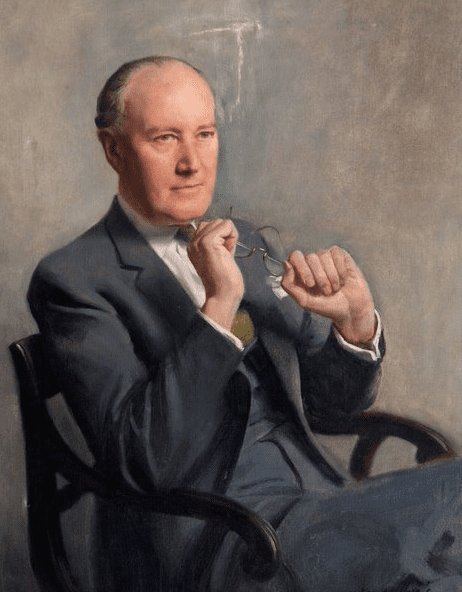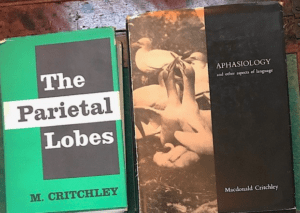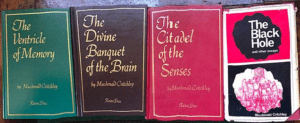JMS Pearce
East Yorks, England
 |
| Fig 1. Macdonald Critchley by Norman Hepple. Credit: National Hospital for Neurology and Neurosurgery, UCLH Arts. Source |
Macdonald Critchley was a neurologist of elegance and sophistication.1 He was pre-eminently a clinical investigator of disorders of higher mental functions, especially those relating to language. He was the author of many beautifully written scientific papers, books, and delightful personal reminiscences.2
Born in Bristol in February 1900, his childhood ability was obvious when he matriculated from the Christian Brothers’ College, aged fifteen; this was too young for admission to Bristol University. He spent his time learning French, German, Latin, and Greek. He served briefly in the First World War and later was asked to organize the Royal Navy neurological and psychiatric services in World War II.
After military service he studied medicine in Bristol, graduating with first-class honors in 1922. As a junior, he worked in Bristol then in London at Great Ormond Street and Maida Vale hospitals, and from 1923 at the National Hospital, Queen Square. He was trained there by Sir Gordon Holmes, James Collier, Kinnier Wilson, and Risien Russell. In 1924 he proceeded MD, and MRCP a year later. Unusually young for such appointments, in 1927 he was appointed consultant at both the National Hospital, Queen Square, and King’s College Hospital. His youthful election to the Fellowship of the Royal College of Physicians followed in 1930. He gave the Goulstonian Lecture to the college in 1931 On The Neurology Of Old Age—a topic then almost wholly ignored. (Marjory Warren established the first English geriatric service at the West Middlesex hospital in 1935.)
On 16 April 1927 Critchley married Edna Morris. Their elder son, Sir Julian Critchley, was a witty, satirical, and controversial MP. His second marriage in 1974 was to Eileen Hargreaves (née Bristow), who proved an invaluable support and co-author of his work on Hughlings Jackson.
In his clinical work, he carried an air of aloof authority, always elegant and polite if not overtly sympathetic. As a popular clinical teacher he was a showman, a polished, sophisticated lecturer in stylish prose so faultless that it could be transferred to paper without correction. He was dean of the Institute of Neurology from 1948 to 1953, president of the Association of British Neurologists, and of the section of neurology of the Royal Society of Medicine. He received many honorary degrees. In later years he was president of the World Federation of Neurology. He was awarded the CBE in 1962 and retired from the National Health Service in 1965, but continued to see patients for many years.
A lucid writer, he published more than 300 single-author journal articles illuminating a wide variety of subjects from arteriosclerotic dementia, semantic dementia (before it was widely recognized), musicogenic epilepsy, electrocution, Parkinsonism, the Kleine-Levin Syndrome of periodic somnolence and morbid hunger, boxers’ brains, and many others topics and curiosities over a period of six decades.
 |
| Fig 2. Parietal Lobes & Aphasiology |
Though rarely overtly critical, modern mass collaborative authors could well heed his comments in a book review about publications of certain conferences and symposia:
The growing practice of indulging in table-talks on a given theme is not altogether a wise one, and the present-day transatlantic habit of treating seriously these off-the-cuff interventions, and even printing them, is rarely a credit either to the author’s good sense or to his command of language. It is the reviewer’s hope that British medicine will avoid these informalities whenever serious subject-matter is under scrutiny.
Critchley was fascinated by the history and especially the individual attributes of his neurological ancestors. The lineage from Hughlings Jackson came to him directly when he was the last house physician to James Samuel Risien Russell, who had been on the consultant staff with Hughlings Jackson, Sir William Gowers, Sir David Ferrier, and Sir Victor Horsley. Hughlings Jackson and William Gowers stood above the rest as his sources of inspiration and conceptual ideas. He published monographs on both: Sir William Gowers (Heinemann, 1949), and with his wife Eileen, John Hughlings Jackson (Oxford University Press, 1998),—the definitive biography published a year after his death.
In later life he interested himself in headaches; he started a headache clinic at King’s College Hospital and was one of the founders of the British Migraine Trust.
 |
| Fig 3. Critchley’s books of Collected Essays |
His interest in the more subtle disorders of higher brain functions emerged early in his career. He was the acknowledged authority on higher cerebral and cognitive functions, introducing many original concepts. His first book, On mirror writing, appeared in 1928. His Parietal Lobes (Edward Arnold, 1953) (Fig 2) remains an unsurpassed classic. He studied minutely many disorders of speech and language, mainly founded on esoteric clinical studies. Developmental Dyslexia (Heinemann, 1964) and Aphasiology (Edward Arnold, 1979) (Fig 2) were works of outstanding scholarship, if not the daily bread of the working physician.
He was also fascinated by oddities in medicine, far beyond the conventional topics of neurology. Many are contained in his erudite books of collected essays: The Black Hole and other essays (1964), The Divine Banquet of the Brain (1979), The Citadel of the Senses (1986), and The Ventricle of Memory (1990) (Fig 3). Within their pages were important biographies and topics as diverse as haptics or the world of touch, famous migraineurs, Oscar Wilde, Samuel Johnson, self-portraiture, gesture, criminal trials, drum talk and whistle speech, and human attitudes to the nose.
Macdonald Critchley was an illustrious, leading figure of twentieth-century neurology, who advanced the culture of his clinical discipline and its many sidelines. Despite severely failing vision he continued to write personal letters and historical articles. He died on 15 October 1997 at his home, Hughlings House, Bridgwater, Somerset, and was cremated.
Books by Macdonald Critchley
- Mirror writing, 1928
- Language of Gesture Studies in Language, 1939
- Shipwreck-Survivors: A Medical Study, 1943
- The Trial of Neville George Clevely Heath, 1951
- The Parietal Lobes, 1953
- The Black Hole and other essays, 1964
- Scientific Foundations of Neurology, 1972
- Developmental Dyslexia, 1964
- Aphasiology And Other Aspects Of Language, 1970
- The Dyslexic Child, 1970
- Silent Language, 1975
- Music and the Brain: Studies in the Neurology of Music with R.A. Henson, 1977
- Dyslexia Defined, 1978
- The Divine Banquet of the Brain, 1979
- The Citadel of the Senses, 1986
- The Ventricle of Memory: Personal Recollections of Some Neurologists, 1990
- The Neurological Boundaries of Reality with Edmund M. R. Critchley, 1995
- John Hughlings Jackson: Father of English Neurology with Eileen Critchley, 1998
End notes
- Compston, A. (2010). Dr Macdonald Critchley (1900–97). Brain, 133, 311–313.
- McDonald WI. Macdonald Critchley. Munk’s roll, 1900-1997, Vol X: 83.
JMS PEARCE, MD, FRCP, is a retired neurologist and author with a particular interest in the history of science and medicine and emeritus consultant neurologist in the Department of Neurology, Hull Royal Infirmary.

Leave a Reply